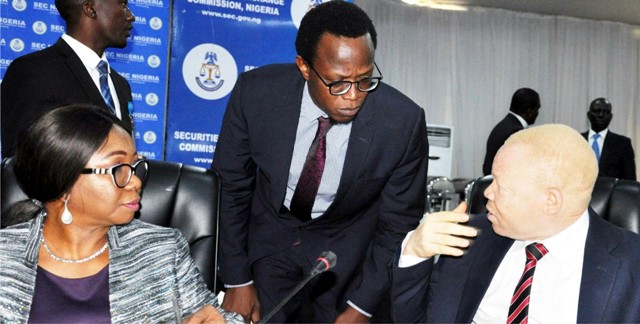Business
NNPC, Osun Partner On Renewable Energy Dev

The management of the Nigerian National Petroleum Corporation (NNPC) says it will partner Osun State government on renewable energy development.
The General Manager, Joint Venture of Renewable Energy Division of NNPC, Mrs Clara Eminike, said this when she led the corporation’s team on a visit to Gov. Rauf Aregbesola in Osogbo, yesterday.
Eminike said NNPC was ready to collaborate with the state government on the mass production of cassava for industrial purpose of bio-fuel programme of the corporation.
She said the partnership was also aimed at linking the energy sector with the agriculture sector through the commercial production of bio-fuel from selected energy crops like cassava, sugar cane and oil palm.
Eminike assured that the collaboration would help to create wealth, diversify energy source and also create jobs for the teeming citizens of the state.
She said the partnership was necessary to efficiently and productively explore the agricultural potential of the state to drive the corporation’s diversification dream from oil and gas to renewable energy development in Nigeria.
“ We know that oil and gas is not renewable and internationally, a lot of people are diversifying from oil and gas to other sources of energy.
“It might interest you that the NNPC is not left out as we have diversified from being an oil and gas company to be an energy company and that is how this comes into play too,” she said.
Aregbesola commended the management of the corporation for displaying high sense of dexterity toward the diversification of the nation’s economy.
The governor described the partnership as a necessity to attract investors, create wealth and generate employment opportunities for the citizenry.
Aregbesola noted that the move would support the farmers, particularly the cassava outgrowers who hitherto faced challenges in marketing their agriculture produce.
Business
FEC Approves Concession Of Port Harcourt lnt’l Airport

Business
Senate Orders NAFDAC To Ban Sachet Alcohol Production by December 2025 ………Lawmakers Warn of Health Crisis, Youth Addiction And Social Disorder From Cheap Liquor

The upper chamber’s resolution followed an exhaustive debate on a motion sponsored by Senator Asuquo Ekpenyong (Cross River South), during its sitting, last Thursday.
He warned that another extension would amount to a betrayal of public trust and a violation of Nigeria’s commitment to global health standards.
Ekpenyong said, “The harmful practice of putting alcohol in sachets makes it as easy to consume as sweets, even for children.
“It promotes addiction, impairs cognitive and psychomotor development and contributes to domestic violence, road accidents and other social vices.”
Senator Anthony Ani (Ebonyi South) said sachet-packaged alcohol had become a menace in communities and schools.
“These drinks are cheap, potent and easily accessible to minors. Every day we delay this ban, we endanger our children and destroy more futures,” he said.
Senate President, Godswill Akpabio, who presided over the session, ruled in favour of the motion after what he described as a “sober and urgent debate”.
Akpabio said “Any motion that concerns saving lives is urgent. If we don’t stop this extension, more Nigerians, especially the youth, will continue to be harmed. The Senate of the Federal Republic of Nigeria has spoken: by December 2025, sachet alcohol must become history.”
According to him, “This is not just about alcohol regulation. It is about safeguarding the mental and physical health of our people, protecting our children, and preserving the future of this nation.
“We cannot allow sachet alcohol to keep destroying lives under the guise of business.”
According to him, “This is not just about alcohol regulation. It is about safeguarding the mental and physical health of our people, protecting our children, and preserving the future of this nation.
“We cannot allow sachet alcohol to keep destroying lives under the guise of business.”
Business
NCDMB Council, Mgt Seek Improvements In Corporate Governance, Performance


